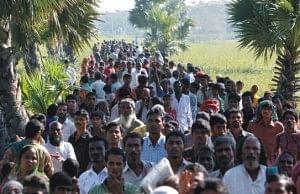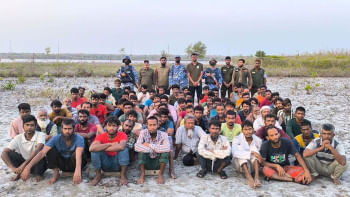Freeing local governments

Photo: AFP
Plainly speaking, local governments are established by the local people to administer to their convenience and comfort by providing, through an elected body, for the repairing, cleaning and lighting of the streets, the construction of footpaths and the distribution of water to public fountains and private houses. In Bangladesh, local governments remained weak and inefficient because of negligence of the central government.
Some feeble and half-hearted attempts were made in the past, but, due to strong reservation of the bureaucracy and national level politicians, no visible progress toward strengthening of local governments could be made.
After Ershad's abdication, the BNP dissolved the upazila system. However, due to intervention by the Supreme Court it is alive today (without any election for the last 17 years). The CTG, because of its totally neutral character and penchant for reform, started taking positive measures to strengthen the local governments to make the foundation of democracy stronger.
The political parties cannot welcome such moves because they have something to lose while the common people have a world to win. So far, all the policies of the CTG have been pro-people. In this case also, it is expected, there would not be an exception.
In overcoming a ticklish issue like holding upazila elections ahead of national election, a serious dialogue among the CTG, the EC, and the political parties is necessary. The press may also be allowed to play some responsible role in the absence of parliament.
In its electoral roadmap the Election Commission declared that it would begin holding polls to city corporations, municipalities, and union parishads in January 2008, and polling would continue till December, but it has not happened. This has resulted in loss of credibility of the EC.
There are problems for the EC. Section 25 of the Upazila Parishad Act, passed in 1998 by the AL regime, empowered the lawmakers to become advisers to the upazila parishads, binding them (Ups) to accept their suggestions.
The good news is that the EC would be empowered to announce schedules for upazila election within a short time, and the act will be amended to delete the provision for interference by MPs in upazila parishad affairs.
It appears that the CTG is keen to hold upazila elections, if necessary in segments, as early as possible. On the other hand, the majority of political parties are opposed to holding the upazila elections before the national election.
The first election to upazila was held in 1985. The very existence of upazila prishads faced a serious crisis following the second election in 1990. Later, the then BNP government dissolved the system. In 1992, the Supreme Court directed the government to hold elections of upazila parishads, but the BNP government failed to comply it during its tenure (1991-96).
Awami League (1996-2001) and BNP-led alliance governments (2001-2006) failed to comply with the directive of the Supreme Court despite extensions of time on many occasions.
It appears that there is somewhat strained relationship between the CTG and the EC and EC and the political parties over holding of elections, primarily on the issue of lifting/relaxing the emergency.
Political analysts are of the opinion that the CTG should have started discussion with the political parties soon after taking the decision in January 2008. Even at this stage, the CTG may go head with the discussion with the political parties to convince them of the rationale of holding upazila election before the national election.
It may be relevant to point out that the CTG has started taking measures to strengthen local governments to improve the foundation of democracy in Bangladesh. The setting up of a high-powered commission to recommend measures to strengthen local governments is underway.
This step has been well appreciated by the civil society, donors and developed democratic countries. The political parties are, however, not so enthusiastic about it.
A local government is not merely a provider of services. It can take an active and constructive part in the business of the government. It can decide for itself, within the limits of what national policies and local resources allow, what kind of services people want and what kind of environment they prefer.
A constitutional expert like Dr. Kamal Hossain says that holding of local government elections has neither legal nor constitutional bar. To him, the matter can be discussed in the dialogues between the government, the Election Commission and the political parties.
The main apprehensions of political parties in holding local elections are:
* It might complicate preparations for national elections;
* Results of election of upazila might influence the outcome of parliamentary elections;
* Simultaneous holding of the national and local polls would be a cost-cutting approach;
* It might delay holding of national election. Major political parties like the BNP and the AL consider holding of election of local government as unconstitutional and, as such, local government elections may only be held after the national election.
* The final decision on this ticklish and sensitive issue has to be taken by the CTG and the EC. The following factors may be taken into consideration:
* The political parties in power could not decide as to what is to be done about holding election for upazila parishads despite directive from the Supreme Court;
* If democracy is to be placed on a stronger footing, strengthening of local government is essential;
* With more efficient local governments the local community will be able to enjoy better amenities and welfare service;
* Holding of local government election is neither unconstitutional nor illegal;
* It can assist in establishing good governance by the central government.
Whatever decision is taken has to be taken quickly so that the common peoples' anxiety dies down.

 For all latest news, follow The Daily Star's Google News channel.
For all latest news, follow The Daily Star's Google News channel. 



Comments